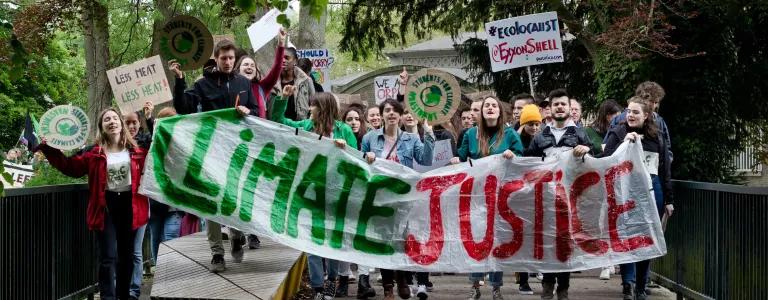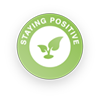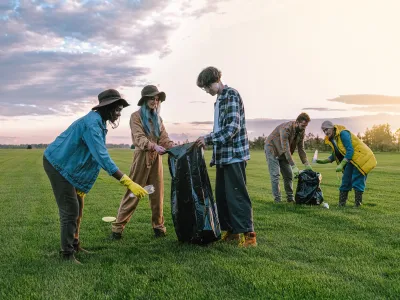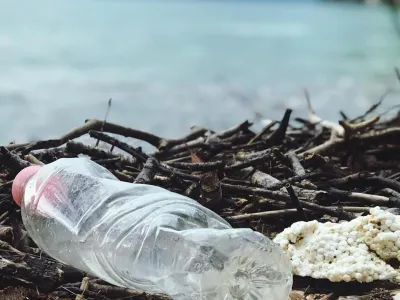
Tackling The Climate Emergency, With Greenpeace
Include this article in your Skills Builder Journal. It could help you develop... 

In June, Greenpeace introduced their new programme, bringing their best thinkers and speakers online to host a series of sessions called Speaker Shorts. Each session is a 15 minute free talk on areas that Greenpeace campaigns on - from protecting our forests and oceans to plastics and the climate crisis - followed by an interactive Q&A.
Five of our NCS Grads joined a recent Speaker Short on tackling the climate crisis in three easy steps. We asked them a few questions afterwards about what they gained from the session. Here’s what they had to say:
What is the main takeaway you got from ‘Three Ways You Can Tackle The Climate Emergency’?
“Climate action can take many different forms and it isn’t something that can be changed by one person or overnight! It’s really easy to fall into a trap of thinking that someone else is handling the problem and that you don’t have anything to add. However, even small lifestyle changes can really help transform our world into a greener and more sustainable society.” - Sanjana
“We should make changes that complement our lifestyle. For some, that might be leaning towards a more plant based diet, for others, that may be buying local homegrown produce from farmers’ markets. It doesn't need to be extreme but an effort from everyone is better than no effort at all.” - Gabrielle
“That we, as individuals, have far more power to change the course of climate change then we’re made to think. By taking charge of our lives and how we treat the earth, we can push the wave of positive change.” - Lucy
“Using your voice and platform in any way you can and teaching others to use theirs should be an everyday task, even if it is frustrating or even exhausting at times. Our potential is greater than we know and more important than ever.” - João
“I didn’t realise how farming meat contributes to the environment and how it affects the biggest forests and deforestations. It made me more proud to be a vegetarian!” - Xena

What is the most important thing you believe someone can do to have an impact on climate change?
“Be vigilant and aware. Rather than just reading about the harmful effects of our favourite fast fashion shop or the overconsumption of meat, we can be thinking about how we can convert knowledge into tangible action.” - Sanjana
“To shop consciously! Industries operate via supply and demand. By demanding more environmentally friendly products and investing in businesses with sustainable practices and products, our needs will be catered for.” - Gabrielle
“Educate yourself. It may be daunting but you can start to dismantle both the complexity of climate change and your own involvement in it.” - Lucy
“Large-scale change depends on small-scale actions. Protesting locally, writing to MPs and raising the awareness of those in our families and close communities are all things we can do within our own sphere of influence.” - João
“Peaceful protesting can help to make a huge difference as this will put pressure on corporations to change the ways they produce so that it’s more ethical.” - Xena

And finally, on a societal level, what changes do you hope to see happen in a post lockdown world?
“Climate change is something that affects us all. Collectively we were complicit in disturbing the planet and collectively we must try to heal it. Coronavirus highlighted the dangers of acting slowly and not seeing something as a serious threat until it materialises for us. Hopefully, this will spur our urgency to act more quickly in the face of the climate crisis. We cannot afford to wait until it is far too late.” - Sanjana
“To see more engagement from the community. Significant changes could be a bigger push for healthier school meals, or using surgeries to discuss green initiatives with your local MP. Other changes would include choosing to cycle or walk more, supporting local businesses in the area and even eating consciously. This could be done by frequenting restaurants in your area; eating seasonally and eating less meat and dairy.” - Gabrielle
“For words and chatter to become action. Lockdown has provided a weird little time for reflection and reevaluating our priorities. With habitats in recovery and animals left to repopulate due to little societal traffic, I hope the world doesn’t forget how devastating human actions can be, and how the planet could recover from our mistakes if we let it. If climate change were to enter parliamentary conversation and government action as frequently and with equal respect as economics, the rest of the country will follow close behind.” - Lucy
“Now that people have had time to recharge and reflect, I hope above all that we return with a renewed energy. I think a significant problem pre-corona was that even if people wanted change, they had little time or energy to fight for it. Now that people have rediscovered themselves, their passions and even their talents I hope they will channel these to implement the change they want to see. We can’t let what we’ve learnt and gained during this period die out.” - João
“I want to see people put more pressure on government authorities to put strict regulations on the industries that are heavily affecting the environment so that our lives can be changed for the better.” - Xena
Greenpeace are set to run more of these talks throughout August, check them out below! Each talk will be followed by a Q&A session where you’ll be able to ask questions and share your thoughts. And then the Greenpeace team will take you through some creative ways that you and your friends can tell others about what you’re doing to make a more sustainable world, and how they can get involved.
The Climate Crisis
What you need to know and what you can do about it
Tuesday 18 August
5pm-5:45pm
A Greener Future
Steps to more sustainable living
Wednesday 19 August
5pm-5:45pm
Deforestation On Our Plates
Saving our forests one meal at a time
Tuesday 25 August
5pm-5:45pm
The Plastic Problem
Beyond the reusable bottle
Wednesday 26 August
5pm-5:45pm
Taking Action
Creative ways to make an impact
Thursday 27 August
5pm-5:45pm
Greenpeace Speaker webinars are a safe and secure way to engage with and explore some of the most important issues we are facing. Find out more and register for Greenpeace Speaker Sessions here.





